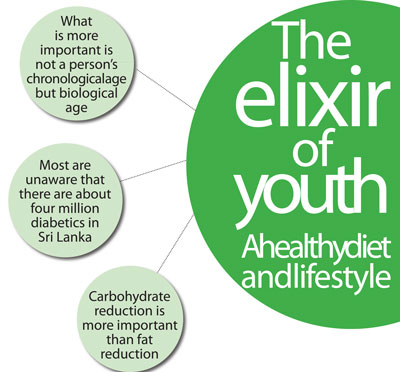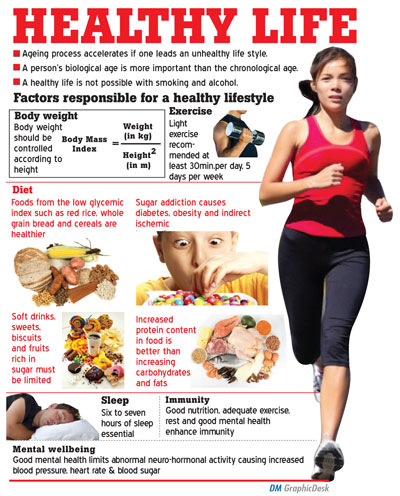29 Mar 2017 - {{hitsCtrl.values.hits}}

 Everyone likes to lead a healthy life but a significant number are not healthy. Some appear to be in good physical health but their mental health is not so. It is common to see individuals who are eighty years or more appear as sixty or seventy year old and in good health, working and attending to their day to day activities. Another group who are about sixty years appears to be about seventy years and are dependent on others to do their work. What is the reason behind this?
Everyone likes to lead a healthy life but a significant number are not healthy. Some appear to be in good physical health but their mental health is not so. It is common to see individuals who are eighty years or more appear as sixty or seventy year old and in good health, working and attending to their day to day activities. Another group who are about sixty years appears to be about seventy years and are dependent on others to do their work. What is the reason behind this?
It is now believed that what is more important is not a person’s chronological age (actual age) but biological age (functional age). If a person leads a healthy lifestyle, he will age slowly and gracefully, while the ageing process accelerates if one leads an unhealthy life style (premature ageing).
What factors are responsible for a healthy lifestyle?
Body weight. One should control body weight according to their height. The commonly used method to find the ideal weight of a person is known as the Body Mass Index. (B.M.I.)

B.M.I. = Weight in Kgs
Height (metres) X Height (metres)
Example –If a person weighs 80kgs and his height is 2m his B.M.I. is 80/4 = 20
A B.M.I. of 25 or less is good, 25 – 30 is overweight and more than 30 is obese. To lead a healthy life, one must aim to have a B.M.I. of 25 or less.
Diet. One must have a balanced diet to be healthy. If your B.M.I. is within the normal range, your diet is probably good. For overweight and obese individuals, carbohydrates and fats in the diet should be reduced and proteins may be increased. Carbohydrate reduction is more important than fat reduction. Earlier it was thought that reducing fat in the diet was more important than reducing carbohydrates to reduce weight but this has been proven wrong.
There are two types of carbohydrates, the ones absorbed quickly (high glycemic index) and the slowly absorbed, (low glycemic index). Sugar, glucose, white rice, white bread and potatoes which are absorbed quickly have a high glycemic index, while red rice, whole grain bread and cereals which are absorbed slowly (low glycemic index), are more beneficial.
The majority of them are asymptomatic and do not know that they are having diabetes. Sugar is addictive and the increased use of it is one of the main causes for diabetes, obesity and indirectly ischemic heart disease. If one is unable avoid sugar, they may use artificial sweeteners which are not ideal, but better than sugar. Fruits containing the sugar fructose in large quantities like pineapple, mangoes and ripe plantains must be limited. Eating papaw, apples and melon which have less sugar is better. Fresh fruits are better than fruit juice. The amount of green leaves, vegetables and proteins could be increased to satisfy your hunger. The amount of carbohydrates is much less in vegetables and green leaves and the absorption is slow. In addition, the increased fibre content is also good for health. Increasing the protein content in food is much better than increasing carbohydrates and fats. Eating fish is better than red meat as it contains Omega III oil which has less fat. Eggs which contain high quality protein are a good source of proteins. An egg a day is not harmful and does not increase blood cholesterol in a significant way.
Unhealthy food All soft drinks, sweets and biscuits, especially ones with a high sugar content should be limited or avoided. Most tinned foods contain high amounts of salt, sugar, fats, preservatives and colouring matter (dyes). Processed foods like bacon and sausages which contain nitrites and excess sodium are known to cause cancer. Fried food, pastries and fast food which are very popular have to be avoided or reduced significantly.

Everyone knows about the harmful effects of alcohol and smoking, but a significant number still continue, as most are addicted. A healthy life is not possible with smoking and alcohol.
Good Food Red rice, whole grain bread, fish, chicken without skin, vegetables, green leaves, pulses, eggs, olive oil or pure coconut oil (most of the coconut oil sold in the open market is adulterated) non-fat milk, butter, soya and fruits are healthy foods. Most margarines contain transfats and are found to increase atherosclerosis and best avoided. If water, lime, tea or coffee could replace soft drinks, it would reduce obesity and diabetes in a significant way.
For obese or overweight individuals, the amount of white rice consumed must be reduced in quantity and replaced with more vegetables, green leaves and protein.
Exercise One should exercises for at least 30 minutes per day for at least 5 days per week, preferably daily. It may be brisk walking, swimming or an active sport like badminton or tennis. An exercise machine is ideal for a person who has no time for outdoor exercise. Exercise helps the muscular and skeletal system be in good shape, it reduces weight, relieves stress and helps the cardiovascular system.
Mental A large number of individuals are under stress due to various reasons; economic, domestic and marital are some. Depression, anger, jealousy and fear leads to an abnormal secretion of harmful hormones and chemicals which affect the smooth functioning of the body. Similarly, the nervous system carries harmful impulses due to the above mentioned causes. This abnormal neuro-hormonal activity causes an increase in blood pressure, heart rate and blood sugar. A happy person who never gets angry sends good nerve impulses and hormonal secretions. This keeps the body healthy.
Immune system Every individual has a disease-preventing, germ-fighting and cancer-preventing system known as the immune system. We are all invaded by millions of bacteria and viruses daily but our immune system protects us. Our bodies produce cancer cells but the immune system protects us from cancer. When this system is weakened, we are at risk of infections and cancer.
What enhances immunity If your body is mentally and physically in good condition, your immunity is strong and the body could successfully overcome infections and malignancy. We are aware that some individuals rarely get ill; this is because their immune systems are in good condition. Good nutrition, adequate exercise, adequate sleep, happiness and the ability to cope with stress and anger are known to enhance immunity.
Similarly, the negative aspect of the above factors weaken the immune system and these individuals are prone to infections and malignancy.
How to detect illnesses early and cure or control them
We all are aware of the present epidemic of non-communicable diseases. The common ones are:
1) Diabetes, 2) Ischemic heart disease, 3) High blood pressure, 4) Cancer, 5) Obesity.
Every adult over 30 years of age must get a fasting blood sugar test done to confirm or exclude diabetes. If there is a family history of diabetes, this test has to be done earlier.
Due to the high incidence of heart attacks occurring in young people, a Lipid Profile test has to be done to exclude high cholesterol levels and other lipids in the age group 30-35.
Blood pressure has to be checked every 3-6 months, especially in those with a family history of high blood pressure.
Cancer now occurs in young adults and appropriate tests have to be done to exclude cancer, especially if there is a family history. All women above 40 should get a mammogram to exclude breast cancer, which is the most common cancer in females. If there is a family history of breast cancer, a mammogram should be done after 30. Mammograms have to be repeated as advised by the doctor. Every male over 60 should do a P.S.A. test to screen for prostate cancer. Cancer, if detected early and treated in time, is curable-especially breast cancer.
Patients with diabetes, hypertension and heart disease could lead a normal life with proper treatment and follow-up.
Your doctor will advise and guide you regarding the tests to be done, treatment to be given and a follow-up. He will refer you to a Specialist if necessary.
23 Dec 2024 59 minute ago
23 Dec 2024 2 hours ago
23 Dec 2024 3 hours ago
23 Dec 2024 3 hours ago
23 Dec 2024 5 hours ago